Confessions of a Convert
This week on HowlRound, ten rising leaders from TCG's SPARK Leadership Program examine leadership, vision, diversity, inclusion, and equity, as well exciting trends and trend makers in our field. Find the full series here.
A few years ago I was sitting at a conference in Chicago listening to a recently arrived (and subsequently too quickly departed), P Carl. Man, that person was nuts! He was going on and on about:
Why does there have to be a single leader at the top? Why is the leadership model in a collaborative art so top down from the rehearsal room to the boardroom and most specifically in the artistic offices? What if we thought about leadership horizontally rather than vertically?
I remember thinking:
That just can’t work! There has to be a leader. Otherwise nothing gets done and everything turns to mush.
Silly Carl.
See, I fell in love with theatre in the 1980s, the age of the auteur director: Peter Sellers, Robert Woodruff, Lee Breuer, Joanne Akalitis. As a grad student I was schooled by Des McAnuff, then Artistic Director of the La Jolla Playhouse, who led with explosive vision, rock star charisma, and intense powers of persuasion. That’s how shit got done, as far as I was concerned—through fierce and singular leadership.
I remember sitting in a tech at another large regional theatre a few years after grad school watching the artistic director hit the climactic moment of the show, call hold, hop up onstage and shout out into the house “OK, so what should we do here?” I was horrified! I called a friend from school: “this guy doesn’t know what he’s doing! How is he in charge?!”
Cut to May 2012 and playwright Karen Zacarías assembles a group of Latina/o theatre artists (via HowlRound) at Arena Stage to discuss the state of Latina/o theatre. Amongst the Arena staff in attendance was that nutty P Carl. He had just launched this thing called HowlRound, and called it a “commons.” Whatever.
While I was dubious at first, I can tell you now that the LTC is the most effective, dexterous, and impactful model for getting sh*t done I’ve come across.
Forty-eight hours later, I am swept up in forming the Latinx Theatre Commons (LTC). We set out a three-year action plan and began to form a national coalition to see it through. While I was dubious at first, I can tell you now that the LTC is the most effective, dexterous, and impactful model for getting shit done I’ve come across.
***
A conversation at the June 2015 Theatre Communication Group National Conference in Cleveland:
Interested Person: So who’s the Artistic Director of the Latinx Theatre Commons?
Me: Oh—there isn’t one
Interested Person: Ok, but who’s in charge?
Me: No one. I mean, a bunch of people.
Interested Person: Huh?
***
In her article kicking off this series, the perpetually curious, restless, and investigative re-definer of leadership, P Carl relates a similar experience at a workshop for not-for-profits. It is very tricky to imagine shared leadership unless you are in it.
The LTC has no Artistic Director or Managing Director. It has no General Manager, Company Manager, Marketing Director, Communications Director, Development Director, Literary Manager, or Artistic Staff. It has one paid staff member, the LTC Producer, Abigail Vega, whose job is to facilitate the activities of the LTC—those activities are decided upon collectively. It has the infrastructural support, partnership, and philosophical rooting of HowlRound.
Since its inception in 2012, the LTC has produced three national convenings, launched an online platform, Café Onda, co-produced Encuentro 2014, a month of Latina/o productions by fourteen Latina/o theatre companies at the Los Angeles Theatre Center, and produced Carnaval 2015, a festival of new Latina/o plays featuring twelve of the nation’s most exciting Latina/o writers hosted by The Theatre School at DePaul University in Chicago.
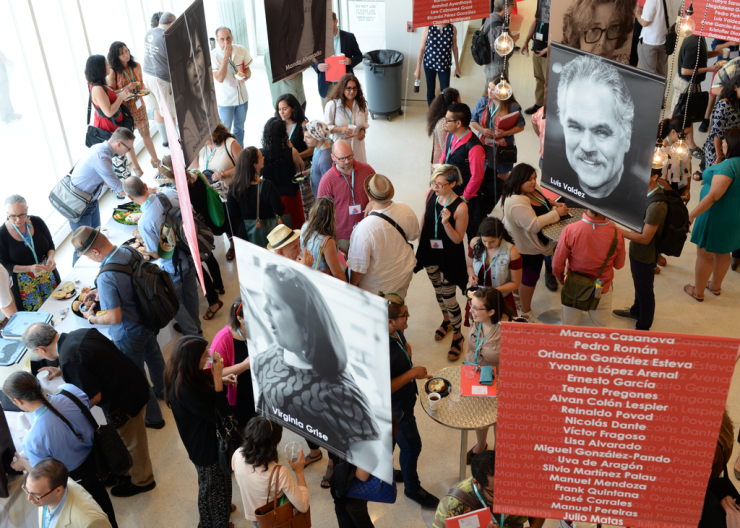
So, if there’s no Executive Leadership and a staff, who did all that and how?
The LTC is a national network of passionate, committed theatremakers who donate their time, experience, and resources to promote Latina/o theatre as central to the health of the American theatre. It is run by a Steering Committee of approximately thirty-five people who collaborate via Basecamp project management software, shared Google Documents, Dropbox, and conference calls. The Steering Committee is broken up into working groups, each of whom has a specific focus. Ongoing workgroups are: Resource Generation and the Café Onda Editorial Board. The other workgroups are project specific. Each group has a champion and five to ten members. The champion’s job is to make sure the group meets regularly and is on track to accomplish its goals. S/he serves as both lightning rod and facilitator, but the group decides the goals and processes.
Additionally, the LTC collaborates with regional alliances and local theatres in their host cities in order to strengthen local and national dialogue and create US-wide interconnectivity.
I’ll use Carnaval 2015 as a specific example of how all this collaboration and consensus-decision making results in action. While I served as a lightning rod, the Carnaval 2015 Task Force was made up of nineteen Steering Committee members, split into five working groups: Selection Committee, Outreach/Invitation, Programming, Host Committee, and Resource Generation. The working groups were coordinated through LTC Producer Abigail Vega, who also served as Company Manager. The Selection Committee determined the projects and the criteria for selection. Outreach/Invitation made sure folks came, Programming determined the zeitgeist of the event and created all ancillary programming, Resource Generation made sure we were funded, and Host made everyone feel welcome (and threw kick ass parties).
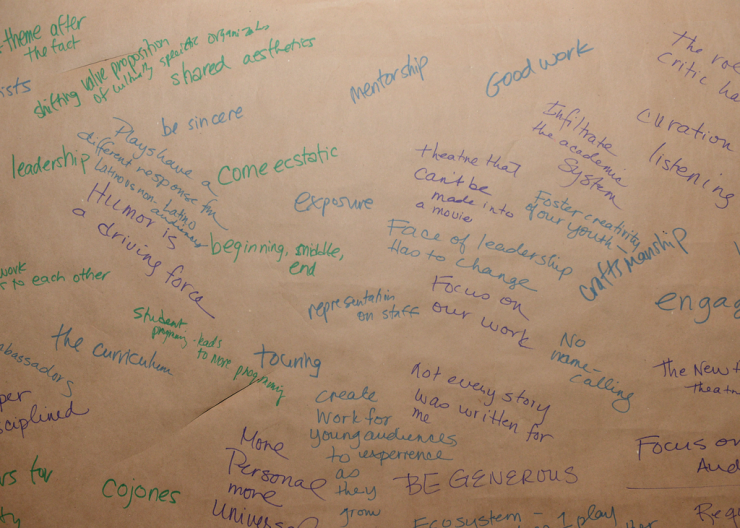
In terms of national and local connectivity, the event was hosted by The Theatre School at DePaul University and produced in association with Teatro Vista and ALTA Chicago (Alliance of Latino Theatre Artists). The faculty, staff, and students of The Theatre School provided invaluable support throughout the planning and execution of Carnaval 2015. Teatro Vista served as Casting Director and issued all actor contracts. ALTA was the central nexus and generator of ideas and events for the Host Committee. Additionally, Victory Gardens Theater and Goodman Theatre came aboard as partners for Carnaval 2015, each making key members of their staff available for consultation and each hosting an event for Carnaval attendees.
The result was a three day festival of new work that featured twelve Latina/o writers, brought in over two-hundred attendees from around the country, highlighted the vibrant Chicago Latina/o theatre scene and its astonishing talent pool, and seeded the field with a new crop of Latina/o plays.
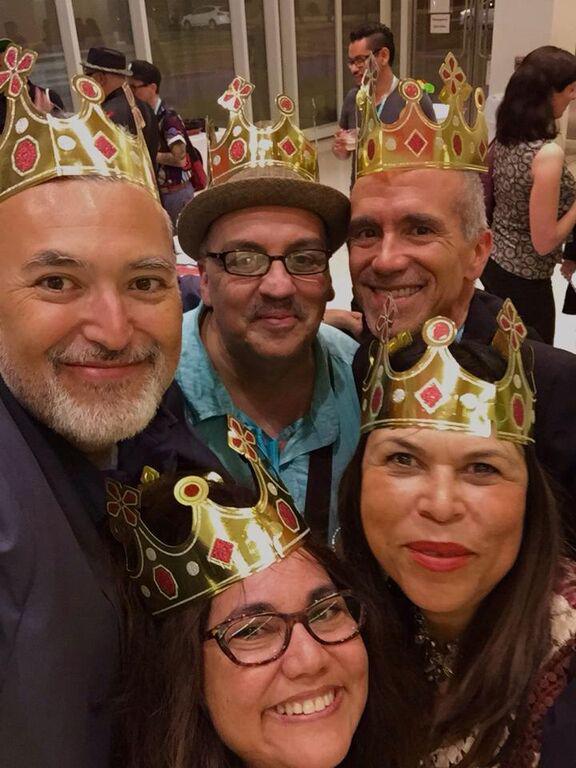
And the work continues. In February, 2015, before the plays were selected, Outreach put out a call to all Steering Committee members asking if anyone who ran a theatre would be willing to commit to producing a play by one of the Carnaval playwrights within the next three seasons. Eighteen theatres came forward. The newly minted LTC Committed Theatres Work Group is now in the process of confirming matches between each of the twelve Carnaval playwrights and one of the Committed Theatres. The result will be over a dozen productions of new Latina/o work in the next three seasons.
***
The LTC is a model of shared leadership in action. As I laid out in a June, TCG Circle Article, the model:
- Creates a big brain trust, taking advantage of a multiplicity of points of view;
- Organically expands the reach of a given event—each person involved brings his/her network;
- Creates a broad base of investment—each person who puts in their time invests themselves in the success of the outcome;
- Promotes local and national connectivity: local theatremakers work with one another and with colleagues from all over the country;
- Circumvents dependency on any one institution and promotes, instead, collaboration across many.
All I’ve gotta say is you’d better watch out for that P Carl. He’ll change your life.




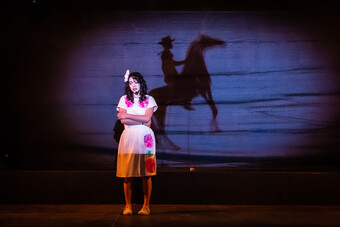


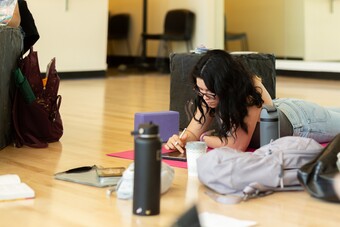

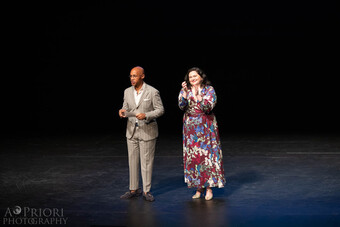


Comments
The article is just the start of the conversation—we want to know what you think about this subject, too! HowlRound is a space for knowledge-sharing, and we welcome spirited, thoughtful, and on-topic dialogue. Find our full comments policy here
Our last day in Chicago, at the LTC steering committee meeting Anthony Rodriguez said something that really hit me--how the experience of participating in the LTC steering committee was life-changing. It is. It continues to be. 30 plus people--teatristas from around the country--it could take a lifetime to amass that kind of personal network. I feel really lucky to be part of this movement, to be a member of a steering committee that works so hard and is reshaping the future of American theatre.
Smiling. Just smiling. And happy to be the newest sliver in the knotty pine.
As with the rest of the SPARK series, this is fantastic work. Bien hecho, Lisa Portes!
In my short time time with the LTC, I've been amazed at the model that Polly Carl and Howlround have established. I've never seen so much mutual respect, support, and unwavering willingness to collaborate. This is truly a model for making theatre in the 21st century and represents the future of the New American Theatre.
Yes, it's all truly amazing. As someone who has been teaching, directing and writing about Latina/o and Latin American theatre for a very long time, the changes that have occurred since the LTC became a reality are beyond anything I have ever seen. And it is happening because of everybody who has unselfishly given of their time and talents. We are at a turning point in the American theatre and our collective efforts show the power of love, commitment and determination.
Psychology used to tell us that dissemination of responsibility created an environment where people felt less responsible. For the LTC, dissemination of responsibility has increased accountability.
LP, Polly is a revolutionary and we are all beyond blessed to have a true visionary amongst us, but the measurable importance of your essay is that it shows your personal evolution on a subject that continues to confound many leaders, boards and stakeholders across the land. Polly and her staff at HowlRound (Emerson College) are a great lab for this new model of leadership and the Latino Theatre Commons is a perfect example of how a group of determined artists has come together to move planets. My hope is that as more artists/academics of your stature come out and advocate for alternative models of leadership in the American Theatre, we would see a positive (and much needed) change in the leadership model of yore. Thx Lisa!